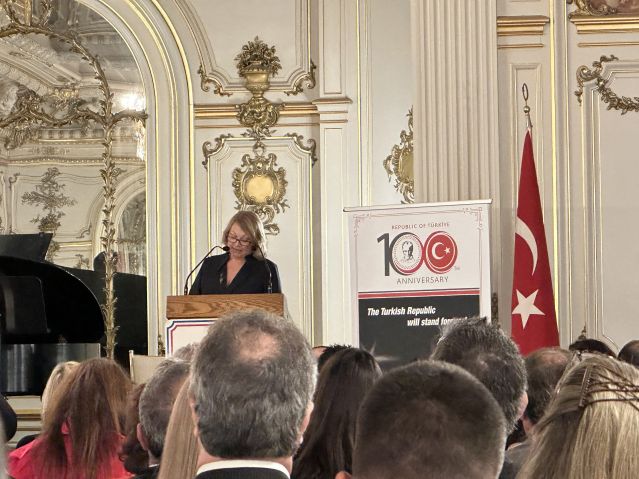Cross-Cultural Psychology
Journeying Across Time and Space Through Music
Transcending national borders.
Posted October 22, 2023 Reviewed by Jessica Schrader
Key points
- Music builds bridges among geographical regions with different cultural identities.
- Current events increase the need to understand the mental health effects of experiencing violence.
- Music can bring us to times and places beyond the reach of conventional means of travel.
In a world where differences in civilizations, beliefs, and ideologies often give rise to skirmishes and warfare (see Samuel Huntington’s thesis, "The Clash of Civilizations"), sometimes as a result of cross-cultural misunderstanding or miscommunication and other times due to conflicts of economic interests, music builds bridges among geographical regions with different cultural identities and provides antidotes to human sufferings as a result of warfare.
With the onset of the recent 2023 Israel-Hamas conflicts, there is a growing need to understand the psychology of antisemitism and mental health concerns resulting from directly and indirectly experiencing violence. At such a critical moment in world history, I am grateful for the opportunity to attend a centennial celebration concert to commemorate the founding of the Turkish Republic as a part of professional development training in music history and cross-cultural psychology. The concert took place on Oct. 11, 2023, in an elaborately gilded concert hall at the Cosmos Club in Washington, D.C. Three concert pieces from the program made a lasting impression on me, so much so that I went on researching the backstories of the pieces and exploring the soundscapes created by various arrangements of the same piece post-concert. These pieces are briefly described below.
1. A.Adnan Saygun – Eski Üslupta Kantat (Cantata in Old Style).
Ahmet Adnan Saygun was a Turkish composer who was among a group that is known as “the Turkish Five” and who championed Western classical music in Turkey. Stylistically, Eski Üslupta Kantat (Cantata in Old Style) can be thought of as operatic pastiches of Giovanni Battista Pergolesi’s Stabat Mater and J.S. Bach’s St. Matthew’s Passions. The instrumental accompaniment of the cantata is structurally and metrically reminiscent of Schnittke’s Concerto Gross No. 3. The work demonstrated the composer’s mastery of Western musical structures, idioms, and styles. At the same time, it infuses fragments of Turkish folk tunes and modes via musical pointillism, a compositional device that spotlights certain notes in a scale that is composed in Turkish mode. According to some background research, Saygun grew up at a time when Turkish was undergoing rapid cultural and societal transformations from the Ottoman Empire’s 600-year rule. Under the leadership of Mustafa Kemal Atatürk, the empire has evolved into a secular republic that endorses Western modernist thoughts and models.
2. Bulbulum Altin Kafeste-My Nightingale is in a Golden Cage – Traditional Rumeli (Folk Song from Thessaloniki for Voice, Piano, and Clarinet).

"Oh, my nightingale, in your golden cage, how sweetly you coo! Oh, my nightingale, cease your song, my beloved is sick!" The beauty of the lyrics of the piece is that it is simple and yet, no less enigmatic and exquisite than Rumi’s poetry. Some have noted that the piece was among Ataturk’s personal favorites. Inferring from the forward-thinking political leader’s aesthetic penchant, someone who is moved by the song may have a sensitive soul, regardless of its public personas. Wearing my educator’s hat, I can think of many ways that the song can be integrated into a K-12 interdisciplinary curriculum to teach aesthetic appreciation and cultural understanding.
3. La Rosa Enflorece-Rose Blooms in May (Sephardic Song for Voice and Cello), Traditional Sephardic.
The song reflects the ethnic diversity within the Turkish Republic since the Ottoman Empire’s rule. According to the narrator, Sephardic Jews co-existed with other ethnicities in the territory peacefully for many generations. The melancholic and haunting melody on the eternal theme of the transience and bittersweetness of romantic love reverberated in the concert hall and projected its intensity across the centuries, making it easily one of the most memorable song selections in the evening’s concert program.
The underrepresentation of non-Western classical music repertoire in today’s concert programs and venues does not reflect the diverse cultural identities that our culture is comprised of. I am grateful for the opportunity to savor the cultural history and psychology of the Turkish Republic from a series of carefully selected and beautifully sequenced concert pieces in the evening’s program. Thanks to the universal language of music, I felt connected to fellow concert attendees who reacted similarly to the music in a shared space in spite of having different cultural/ethnic identities and were attending the event for different reasons.
Music brought us to times and places beyond the reach of conventional means of travel and facilitated our understanding of nations/cultures that are not always discussed in depth in history textbooks. In a single evening, I experienced the healing power of music in assuaging the existential angst from being bombarded with news on political turmoil, economic uncertainties, and inflicted cruelty when humanity is at its worst.


